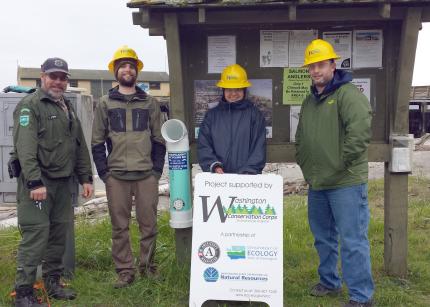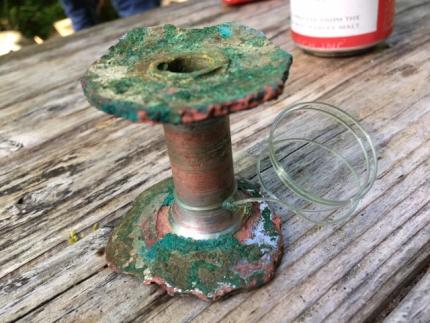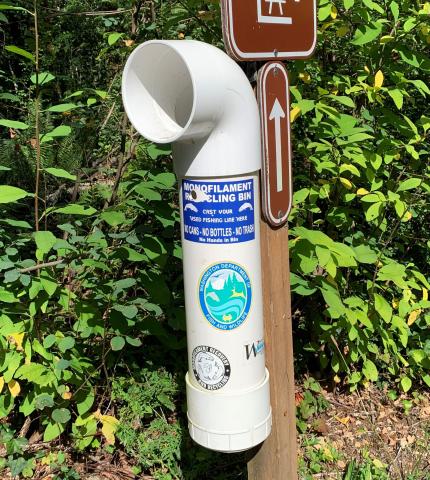
Monofilament fishing line is incredibly strong, durable, and long lasting, making it an ideal tool to catch everything from small pan fish to 180-pound halibut. It is estimated that monofilament line takes 600 years to break down once discarded! This means that monofilament line can cause problems throughout the environment when it is lost during fishing (e.g., when cutting loose a snagged lure) or improperly discarded overboard.
When cut, or left in nature, strands of monofilament line can get wrapped around a fish’s gills or a bird’s beak and cause amputation, or even death. Balls of tangled strands and smaller clipping of lines, by contrast, can be consumed by a variety of animals, taking up valuable space in the stomach and limiting intake of food. In time, monofilament blockages lead to malnutrition, weakness, and even death. Monofilament line injures and kills wildlife indiscriminately, with both common and protected species falling victim.

“I was fishing in 220’ of water and hooked this on the bottom (see photo). I pulled up all of the line hoping a lure was on the other end, no lure attached. I cut off all the line except 2’ still attached to the spool and recycled it. To my surprise the monofilament line was in perfect condition!
The entire reel (less the spool) rotted away including the attachment to the fishing rod.”
This experience shows that while other parts of fishing rods may gradually degrade underwater, lost monofilament line remains intact and may have lasting negative consequences on the ecosystem. It only takes one line snagged in a tree or in the water to entangle and kill.
Fishing line can be hazardous to people recreating in and around the water as well. Monofilament fishing line is difficult to see and swimmers and people playing in the water can be tangled or cut by improperly discarded fishing line; fishing line tangled around branches or rocks poses a tripping hazard to people walking along waterways; and fishing line wrapped around the prop shaft of an engine can damage seals and lead to hefty repair bills.
What’s Being Done?
The Monofilament Recovery & Recycling Program builds, installs, and maintains monofilament recycling bins throughout Washington State. The program, initiated in 2016, has helped place over 140 recycling receptacles at freshwater and marine fishing locations across the state. Public employees and volunteers empty the bins monthly. Puget Sound Corps (part of the Washington Conservation Corps) crew members funded by the Department of Natural Resources (DNR) sort the contents of each bin and isolate the monofilament line to be packaged for recycling. In just the first few years of the program over 142,000 feet of monofilament line was recovered from the bins for recycling.

What You Can Do:
- Put only used fishing line in a monofilament recycling bin. Dispose of lures, bait, and other trash in garbage cans, and remind others to do the same.
- Pick up monofilament line that you find and dispose of it in a bin, or a garbage can if a bin is not available. A little time picking up line and litter could save a life.
- Report tangled animals immediately. Find a park ranger or call your regional WDFW office to report an entangled animal. Contact a local WDFW regional office.
- Replace your monofilament line regularly, as it can become damaged or brittle over time and have a greater chance of breaking. Switching to biodegradable line instead of monofilament would be a huge step towards eliminating this problem.
- Volunteer to install, monitor, and/or maintain a bin, emptying it of line on a monthly basis. Contact your local park or marina to see if they are interested in installing a bin. (WDFW may be able to supply a bin, contact Lisa Hillier at Lisa.Hillier@dfw.wa.gov for more information).
Monofilament Recycle Sites
View larger mapPartners
- Bainbridge Island Metro Park & Recreation District
- City of Des Moines
- City of Seattle
- Inland Northwest Wildlife Council
- Department of Natural Resources
- Mason County Parks & Trails
- Port of Allyn
- Port of Bremerton
- Port of Brownsville
- Port of Hoodsport
- Port of Ilahee
- Port of Indianola
- Port of Manchester
- Port of Seattle
- Port of Silverdale
- Port of Waterman
- Suquamish Tribe
- Town of Steilacoom
- Vashon Park District
- WDFW Fish Program
- WDFW Habitat Program
- WDFW Wildlife Program
- Washington State Parks